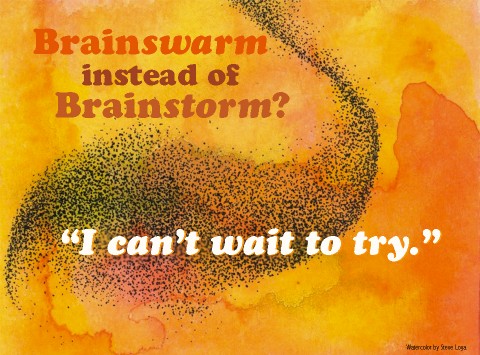Brainswarm Instead of Brainstorm
April 1, 2014 3 CommentsThe recent barrage against the effectiveness of brainstorming has been a bit hard for those of us who are grounded in the Interaction Method. But evidence matters, doesn’t it? I know that Curtis has talked about the limits of brainstorming a couple of times in this blog.
We have started experimenting with the practice of giving participants some time to think on their own before the brainstorm begins. It certainly is an upgrade.
But as the video above describes it, the idea of “brainswarming” takes the concept even further. In this short video, Dr. Tony McCaffrey outlines a method that I can’t wait to try. I like the idea because it taps my passion for network thinking at its most organic – the moment of the swarm. And I also like it because it addresses the persistent problem of facilitation biasing extroverted thinking.
I’ll let you know how my experiment goes. You let us know if you try it first!

3 Comments
G-man – Thanks for the post. I’m not sure I’m sold on Brainswarming or Brainstorming. I AM sold on the notion that we need good ideas – no matter how we arrive at them.
Fun to see another version of this. I’ve been using a similar “idea tree” for the past several years inspired by Freire’s “Problem Tree”. I like that it strengthens a group’s ability to to discern between actions and outcomes.
I use three different colored/shaped post it notes to have individuals note The Problem (definition/roots), Resources (at hand or needed/trunk & branches), and Activities (current or possible/leaves), We reconvene in small teams so that team members can group them and move them around to create potential courses of actions on their idea trees.This can be done over 15 minutes or over a week on the lunchroom wall.
When we re-gather for a silent gallery walk where we see the work of each small team, we quickly discover what the “roots” of the problem are, and with resources branching out, we can have a conversation to identify which activities are leaves and which are “fruit” — the ideas we’ll harvest to test out.
No objections from me to finding alternatives to brainstorming. But, I do object to the implication that because brainstorming doesn’t work for everything, the only real alternative is to stop talking all together. Seems like quite a leap. And, as we promote in our practice, there are many conversational tools, some which work better to accomplish one kind of goal and some for another.